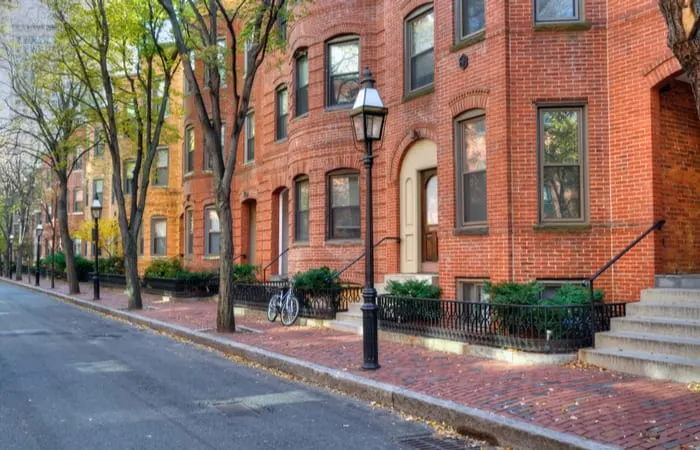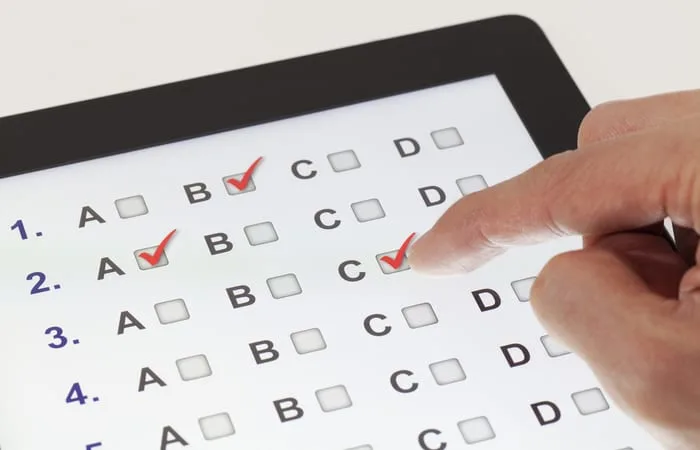Wondering if you should go to real estate school and get a real estate license in Massachusetts?
There are some critical steps and factors involved in getting your real estate license in this small, densely populated state.
Did you know that you can get your Massachusetts real estate salesperson license on the same day you complete and pass your real estate license exam? In this guide, we’ll look at a few things:
- Education requirements and rules you’ll have to meet
- The cost of each step
- Massachusetts license exam tips
- The Best companies and brokerages to work for in the state
- The fastest-growing areas to begin your real estate career
While this career isn’t for everyone, we hope our complete guide helps you determine whether or not to proceed. Ready to get your Massachusetts real estate license? Let’s get started!
Key Massachusetts Real Estate Statistics
Massachusetts is a small state with a rich history. It was the site of the Boston Tea Party, the start of the Industrial Revolution, the American Revolution, and the nation’s very first subway system.
It’s home to the prestigious Harvard University, which was the first college established in North America back in 1636. It’s also home to a little school called MIT. You’ve probably heard of that.
Massachusetts residents’ median age is 39, which means there are lots of residents who are at the prime age for purchasing a home (the average person buys their first home at 33).
Home to grassy interior and coastal lowlands, offshore islands, the sloping remnants of ancient mountains, and densely forested hilly uplands, the state’s topography offers something for everyone.

Jorge Salcedo/Shutterstock
Massachusetts Population: Fastest-Growing Areas
Massachusetts has a current population of about 6.98 million, making it the 14th most populated state in the United States and the 3rd most densely populated state in the nation.
The fastest-growing and largest counties in Massachusetts are:
- Middlesex County (1 million+)
- Worcester County (800,000+)
Its fastest-growing areas are concentrated in the two main metropolitan areas in the state: Greater Boston and Springfield. Greater Boston is home to about 2/3 of the state’s population!
How to Get Your Real Estate License in Massachusetts
Here’s a quick overview of the steps you’ll need to take to get your Massachusetts real estate license (salesperson or broker).
There are quite a few steps and requirements involved, but once you know the process, you’ll be one step closer to being a Massachusetts real estate agent or broker!
- At least 18 years old
- Have a Social Security Number
- Complete 40-hour Massachusetts real estate course
- Get three candidate endorsements from non-family members
- Register for the licensing exam
- Pass the licensing exam ($85)
- Pay for your Massachusetts real estate license ($103 to $150)
- Have at least three years of experience as a licensed real estate agent
- Complete 40 additional hours of real estate education
- Be bonded for $5,000
You don’t have to be a resident of Massachusetts to get your real estate license here. If you are 18 years of age or older and can produce your Social Security Number, you’re eligible to take the course, register for the exam, and get your license.
Let’s talk about each part in more detail so you’ll know what to expect each step of the way.
Step One: Complete the Education Requirement
The first step you’ll take (beyond being at least 18 years old and having a valid Social Security number) is completing your education requirement. In Massachusetts, that means completing the required 40-hour Massachusetts real estate course.
You can take your Massachusetts real estate course online or in-person. The State of Massachusetts real estate commission that oversees all licensing and education requirements is called the Board of Registration of Real Estate Brokers and Salespersons.

Takayku/Shutterstock
Your real estate course will feature the same information, whether you take it online or in person. Your schedule will vary based on which option you choose.
If you sign up for an online (distance learning) course, you can take the class on your own schedule as long as it is completed within six months after you pay for the course.
If you take the class in person, your schedule will be based on the individual school’s or instructor’s policies. In-person classes may be night classes, weekend classes, or daytime classes.
Massachusetts Real Estate Course Pricing
Massachusetts real estate course pricing is more affordable than you might think. You can expect to pay about $250 to $350 for the course, depending on the real estate school you choose.
Make sure the school you choose has Massachusetts State approval. Don’t worry, here’s the link for the list of approved schools.
Once you’ve finished the 40-hour course, you can take practice tests to look at your comprehension of the material and make sure you’re ready for the next step.
Step Two: Register and Take the Licensing Exam
With the successful completion of your 40-hour course, you are eligible to register for the Massachusetts real estate licensing exam.
Without passing this exam, you will not be able to become a real estate agent (salesperson) or broker, so this step is incredibly important.
You can register online for the licensing exam through the nationwide testing provider, PSI. When you’re ready to register, you can visit this page to find a convenient date, location, and time for your exam.

Ymgerman/Shutterstock
Massachusetts Real Estate License Exam Information
The exam is made up of 120 multiple-choice questions. There are two sections in the exam, which are the national and state (Massachusetts) sections.
The national portion of the exam, made up of 80 questions, is the same in every state. The state section, made up of 40 questions, is unique to each state and asks questions about state laws and regulations.
Passing the exam requires getting at least 70% of the questions correct in both sections. If you pass one section but fail the other, you’ll have to retake the failed section of the test on a different date.
You’ll have a chance to review all your answers before you officially submit the exam to be scored. When you arrive at the testing facility you registered for on your scheduled test day, you will need to bring two forms of identification to prove your identity.
Primary ID (bring one)
- Driver’s license
- Learner’s permit
- National, state, or country ID card
- Passport
- Military ID
- Alien Registration Card
Secondary ID (bring one)
- Credit or debit card with your signature
- Social security card
- Additional primary ID form
After checking in to the testing facility, you’ll be assigned a computer where you will take the exam. You’ll get 2 hours to finish the longer national section and at least 1 hour and 30 minutes to complete the shorter Massachusetts section.
Once you finish and submit your answers, you will immediately be shown your score for each section and whether you passed or failed. If you pass the exam, you will be able to get your license right away at the testing center.
Your license will include your photograph. You’ll receive a physical license card and a wall certificate. You may be required to hang the wall certificate in a conspicuous place in your broker’s office.
Massachusetts Real Estate Licensing Exam Pricing
The exam fee is $85 for the salesperson license (real estate agents). You will pay the exam fee regardless of whether you pass or fail either section. If you must retake the exam, the fee drops to $54.
The real estate license, if you pass the exam, is $103 to $150. There is an additional $12 PSI license fee as well. You will not pay the license fee if you do not pass both sections of the exam.
You will be responsible for paying the license fee on the day of your exam if you pass. Be sure to bring a checkbook and credit card. Many testing centers accept both, but this is always subject to change.
Step Three: Choose Your Brokerage
Once you have your Massachusetts real estate license in hand, you can start looking for a brokerage to work under. The state requires that you work under a licensed broker or brokerage to actively work as a real estate salesperson.
“The active experience as a salesperson begins when the Board is notified in writing of a salesperson’s association with a broker. “The employer must furnish the board with the names, addresses, and license numbers of all licensees engaged by the broker at the commencement or termination of employment or association.”
-Massachusetts License Law
Once you’ve found a broker to work under, they will submit your new association with them in writing to the board. This begins your “active experience” as a salesperson. But how do you find a broker to work under?
Some choices can help your career get off to a great start, while the wrong choice could hinder you from the beginning. Some brokerages start new agents off with additional training, enhanced support from experienced agents or brokers, and special commission structures.

Stokkete/Shutterstock
Some will offer to pay for your continuing education over the years. Make sure you check the policies of any brokerage you’re considering choosing. Another factor to consider is the fees some brokerages charge real estate agents who work there.
You might be expected to pay a franchise fee (if the brokerage is part of a franchise) or a desk fee (to cover your desk and supplies at the brokerage). Don’t necessarily shy away from brokerages that charge fees like these.
You may see a higher commission split and increased support and training at these locations. On the other hand, brokerages that don’t charge additional fees may allow you more freedom and leeway. But you should consider both.
Best Massachusetts Brokerages to Work for
- Stuart St. James: Best for agents who want to hit the ground running, don’t need much support or training, and want to keep 100% of their commissions.
- Keller Williams: Best for new agents who want a fair commission split (keep 64% of your commissions until you reach $100,000 in gross commission). You’ll pay $50 to $80 per month in desk fees, and 6% of your commission covers franchise fees.
- RE/MAX: Best for agents with some experience who want to keep most of their commissions (95/5 split) and don’t mind paying a desk fee and covering the cost of their own leads.
- Clockhouse Realty: Best for agents who want to work for a remote, independent brokerage with no desk fees, high commissions (90% to 100%), and the freedom to handle their own marketing.
Consider how much you’re willing to share with a brokerage in commissions to get additional training, more leads, insurance options, and reduced upfront monthly fees.
You might find that it’s more beneficial to receive a lower percentage of your commission in exchange for this kind of extra help.
Maintaining Your Real Estate License in Massachusetts
Once you’ve received your Massachusetts real estate license, the license is active for two years. After that two-year period passes, you will need to complete 12 hours of continuing education to keep your license active for the next two-year period.
“If you do not complete the 12-hour continuing education requirement by your scheduled license renewal date then the Board must, by law, renew your license as “inactive.”
Without an active license, you are not permitted to work as a real estate agent. You must plan to complete your 12 hours of continuing education before your active license period ends.
If your renewal date passes and you haven’t taken your CE courses, your license will be renewed as “inactive.”
Should You Become a Massachusetts Real Estate Agent?
Becoming a licensed real estate agent in the State of Massachusetts is a process that requires adequate planning and follow-through. If you believe real estate is the career path for you, you’ll have to take the 40-hour course.
You’ll need to pass with at least 70% and obtain your license as a real estate salesperson. Finding the right brokerage to work with can be a little trickier, but keeping the right criteria in mind while you search will help you make the best decision for you.
If you’re interested in finding a good Massachusetts real estate school or just learning more about the requirements to be licensed in this state, check out the additional resources below.
Our Favorite Real Estate School
Let’s face it: it’s the digital age, and your schedule is busy. Why tie yourself to a set schedule by choosing a brick-and-mortar school? Don’t worry, there’s an alternative.
Real Estate Express offers flexible course options that are completely online. This means you can take your real estate courses from the comfort of your own living room, whenever it is convenient for you.

